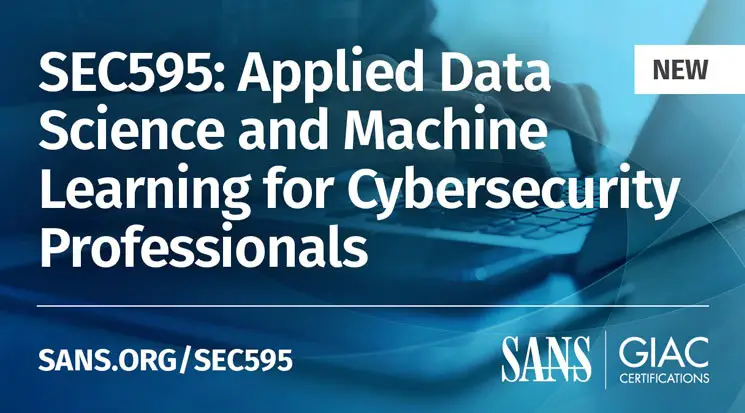SANS SEC595: Applied Data Science and Machine Learning for Cybersecurity Professionals

Data science, artificial intelligence, and machine learning are not just current buzzwords, but they are quickly becoming one of the main tools for information security. The SANS SEC595 course fully teaches machine learning and data science. More than 70% of class time is spent solving machine learning and data science problems rather than talking about them. Unlike other courses, this course is completely focused on solving information security problems and teaches almost all the theoretical stuff, this course strikes a balance. We only cover the theory and basics of education. This course gradually introduces and applies various statistical, probabilistic, or mathematical tools (in their applied form) and allows you to learn the ability to use those tools. The practical projects covered were selected to provide you with a broad base to learn your machine learning solutions more comprehensively.
Data Science, Artificial Intelligence, and Machine Learning aren’t just the current buzzwords, they are fast becoming one of the primary tools in our information security arsenal. The problem is that, unless you have a degree in mathematics or data science, you’re likely at the mercy of the vendors. This course completely demystifies machine learning and data science. More than 70% of the time in class is spent solving machine learning and data science problems hands-on rather than just talking about them.
Unlike other courses in this space, this course is squarely centered on solving information security problems. Where other courses tend to be at the extremes, teaching almost all theory or solving trivial problems that don’t translate into the real world, this course strikes a balance. We cover only the theory and math fundamentals that you absolutely must know, and only in so far as they apply to the techniques that we then put into practice. The course progressively introduces and applies various statistic, probabilistic, or mathematic tools (in their applied form), allowing you to leave with the ability to use those tools. The hands-on projects covered were selected to provide you a broad base from which to build your own machine learning solutions.
Major topics covered include:
- Data acquisition from SQL, NoSQL document stores, web scraping, and other common sources
- Data exploration and visualization
- Descriptive statistics
- Inferential statistics and probability
- Bayesian inference
- Unsupervised learning and clustering
- Deep learning neural networks
- Autoencoders
- Loss functions
- Convolutional networks
- Embedding layers
BUSINESS TAKEAWAYS:
Thise course will help your organization:
- Generate useful visualization dashboards
- Solve problems with Neural networks
- Improve the effectiveness, efficiency, and success of cybersecurity initiatives
- Build custom machine learning solutions for your organization’s specific needs
You Will Be Able To:
- Apply statistical models to real world problems in meaningful ways
- Generate visualizations of your data
- Perform mathematics-based threat hunting on your network
- Understand and apply unsupervised learning/clustering methods
- Build Deep Learning Neural Networks
- Build and understand Convolutional Neural Networks
- Understand and build Genetic Search Algorithms
You Will Receive With This Course:
- A supporting virtual machine
- Jupyter notebooks of all of the labs and complete solutions
This Course Will Prepare You To:
- Build AI anomaly detection tools
- Model information security problems in useful ways
- Build useful visualization dashboards
- Solve problems with Neural networks
Additional Resources:
- Anaconda
- TensorFlow (and supporting libraries)
- Matplotlib
- VMWare Workstation/Player/Fusion
SANS SEC595: Applied Data Science and Machine Learning for Cybersecurity Professionals
Download – eBooks 2023









